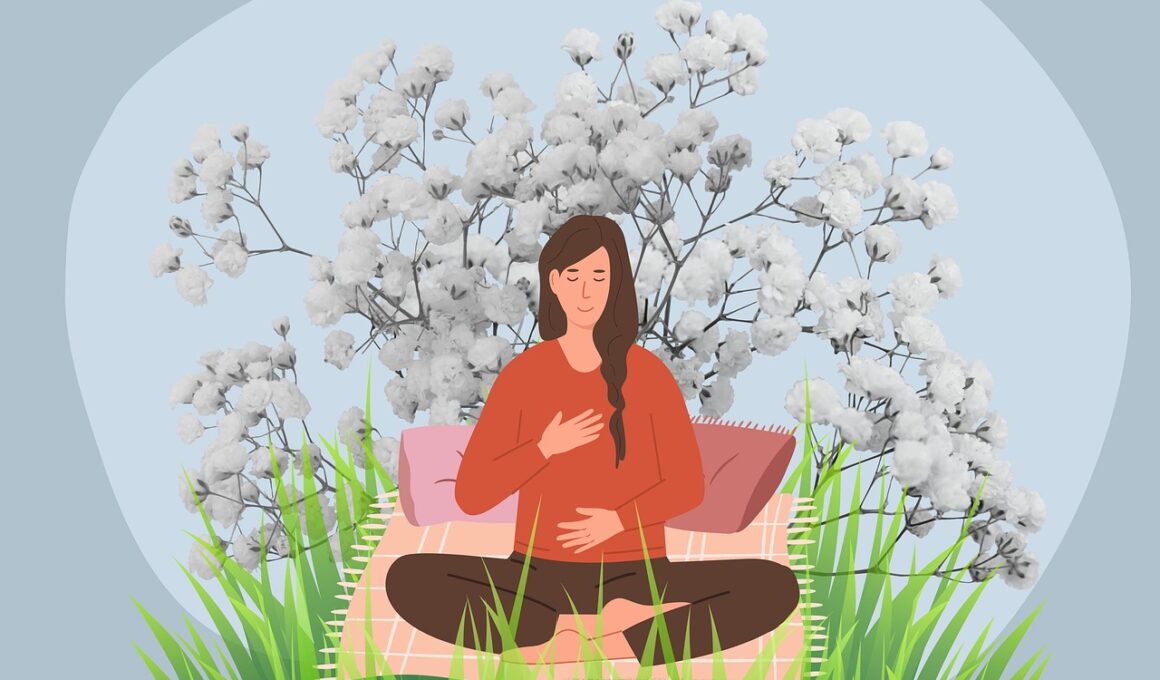Meditation Apps with Breathing Exercises to Calm the Mind
Meditation has become increasingly popular, and incorporating breathing exercises into meditation apps can significantly enhance the experience of users seeking calmness and relaxation. These apps guide users through a variety of exercises designed to help them focus, alleviate stress, and improve overall mindfulness. Not only do they provide structured guidance, but they also teach techniques beneficial for everyday life. With so many options available, discerning which meditation app suits your needs can be daunting. Understanding the core features of these apps may assist users in making informed choices. Breathing exercises help cultivate inner peace, allowing individuals to reconnect with their environment and negative emotions. Many apps now offer free trials, allowing potential users to experience the app’s features before committing to a purchase. This ensures the app resonates with their preferences and meditation goals. The user interface, sound quality, and instructional clarity further enhance the user experience, making meditation easier and more accessible than ever before. The promise of these applications lies not just in their immediate benefits but also in their ability to foster long-term mindfulness habits that can assist in navigating life’s challenges.
Benefits of Guided Breathing Techniques
Among the various features found in meditation apps, guided breathing techniques particularly stand out. These techniques invite users to control their breath thoughtfully and purposefully, leading to a calmer state of mind. Many individuals underestimate the impact of proper breathing on overall well-being. Emphasizing breath control is central to mindfulness practices, as it helps to ground users and reduce anxiety. Users can manage racing thoughts and overwhelming emotions effectively with consistent practice. Engaging in structured guided breathing sessions allows users to immerse themselves in the moment fully. Moreover, these sessions cater to varying skill levels, empowering both beginners and seasoned practitioners alike. Users can follow along with audio instructions, visual cues, and background music, ensuring a comprehensive sensory experience. This aspect often leads users to adopt mindfulness exercises into their daily routines unconsciously. Regular practice helps cultivate emotional intelligence and resilience against stressors. As mindfulness becomes increasingly integrated into daily life, cultivating self-awareness and managing emotional responses becomes easier. Meditation apps with a focus on guided breathing techniques can pave the way for greater emotional stability and healthier coping mechanisms for stress.
When exploring meditation apps, it’s important to evaluate their specific features to find the best fit. Users should consider user-friendly interfaces, diverse breathing exercises, and a variety of meditation sessions. Look for apps that offer playlists designed for different times of day, guiding users toward relaxation or focus as needed. Many of these apps also allow personalization, letting users set reminders or adjust session lengths for convenience. Features like progress tracking can further enhance motivation, allowing users to visualize their growth over time. Regular notifications can encourage users to stay consistent in their practice, making it easier to integrate mindfulness into their routines. Additionally, users should pay attention to the app’s community features, such as forums or social sharing options that encourage user engagement. Some apps even have instructors available for real-time interaction, enhancing the sense of belonging and support. Researching user reviews can provide valuable insights into the app’s effectiveness and the experiences of others. Overall, taking time to discover the app’s targeted audience and methodologies will ensure the right match and enhance one’s journey toward calmness through focused breathing exercises.
Several apps stand out in the crowded market, making them favorites among users. Notably, Headspace offers a wide range of guided breathing and meditation exercises tailored to suit different needs. Its visually appealing interface coupled with its structured programs offers an excellent introduction to meditation for beginners. Another strong contender, Calm, highlights relaxation with soothing soundscapes and breathing techniques integrated into its sessions. Many users appreciate its sleeping aids, making it a multifaceted app for overall well-being. Breethe is quite popular among those looking for a comprehensive solution, combining guided meditations, breathing techniques, and sound therapy, catering to various lifestyles. Each of these apps excels in offering support through instructional feedback and enhancing relaxation practices. Comparatively, Sattva focuses on ancient Eastern practices, providing a more spiritual tone to meditation that resonates with many. Faster and flexible breathing sessions cater to busy lifestyles, making mindfulness accessible whenever needed. All these options showcase how diverse meditation apps can cater to different audiences, helping users incorporate mindfulness into everyday life, fostering calm and presence.
Beyond the well-known meditation apps, various lesser-known ones are gaining traction for their unique approaches to breathing exercises. Apps like Insight Timer and Pocket Yoga have carved niches for themselves by offering comprehensive guidance in specific areas, including breathing. Insight Timer features thousands of free resources, facilitated by experienced teachers worldwide. This platform supports community-driven learning, allowing users to interact and share their mindfulness journeys. On the other hand, Pocket Yoga provides a blend of yoga and meditation, focusing on breath synchronization with physical movement. Users appreciate having a versatile tool for both breathing sessions and physical wellness. Furthermore, Simple Habit is rapidly becoming popular among busy professionals, as it emphasizes short 5-minute sessions catering to tight schedules. Breathing exercises in this app are specifically designed to alleviate stress after a hectic day. Exploring these diverse options allows individuals to find a meditation app that complements their lifestyle and preferences while promoting emotional well-being and mindfulness.
Accessibility and affordability make meditation apps a revolutionary option for stress relief. Many leading apps offer free versions alongside premium subscriptions, making meditation accessible to a broader audience. With various price points, individuals can experiment with multiple apps before committing. Moreover, users can explore the advantages of family plans or shared accounts, promoting collective mindfulness within communities. Some apps even integrate gamification elements, which boost motivation through personal achievements or leaderboard rankings. These features help combat the feeling of isolation often associated with self-care practices. Whether in crowded public places or their living rooms, users can find support despite individual circumstances. Additionally, offline capabilities allow users to download sessions, facilitating meditation and breathing exercises without relying on Wi-Fi, ensuring flexibility. Users can plan and schedule cleansing moments throughout their day, regardless of their surroundings. The ability to access these resources at any time translates to empowering users to prioritize their mental health. As more people turn to meditation apps, the potential for collective well-being increases, nurturing a more peaceful society where calmness is prioritized and practiced diligently.
To conclude, meditation apps integrating breathing exercises present valuable tools for individuals seeking inner peace and mindfulness. These applications allow users to explore various techniques, addressing specific needs and preferences while promoting consistent practice. Recognizing the powerful impact of breath control fosters emotional resilience in users, enhancing their daily lives. Choosing the right app tailored to one’s personal style is crucial and can lead to significant changes in mindset and well-being. Besides the essential features, looking for compatible learning communities can enhance the meditation journey, encouraging users to support one another. Continuous engagement fosters deeper connections and shared experiences, enriching personal growth. The opportunities offered by these mindful tools are extensive, facilitating users’ exploration of different scenarios and environments in which meditation may be practiced. As users await the calming embrace of breathing exercises, the journey can yield tremendous rewards for mental and emotional health. With consistent practice and the right support, individuals can cultivate a lasting relationship with mindfulness that extends far beyond the app, embracing serenity in every facet of life.
As technology continues to evolve, it’s exciting to imagine how future meditation apps may further innovate in integrating breathing exercises within their platforms. Users may benefit from advancements such as personalized AI recommendations based on their moods and preferences. Such developments might tailor breathing exercises to address specific anxiety triggers or stress points, making meditative practices more impactful. Video content featuring real-time guidance could also enhance engagement, immersing users directly in calming atmospheres. Additionally, more cutting-edge features like biofeedback could enable users to monitor their physiological responses during breathing exercises. This data-driven approach to mental health may pave the way for personalized programs that adapt as users progress. Exploration into virtual reality could redefine mindfulness experiences, creating immersive environments conducive to relaxation and stress relief. As these innovations unfold, they are likely to democratize access to mindfulness resources, driving widespread adoption and support. The future of meditation apps seems promising, inspiring individuals to embrace self-care routines that fit seamlessly into their busy lives. Overall, the intersection of mindfulness and technology paints an exciting future for mental health, bridging gaps and creating enduring practices for tranquility.


